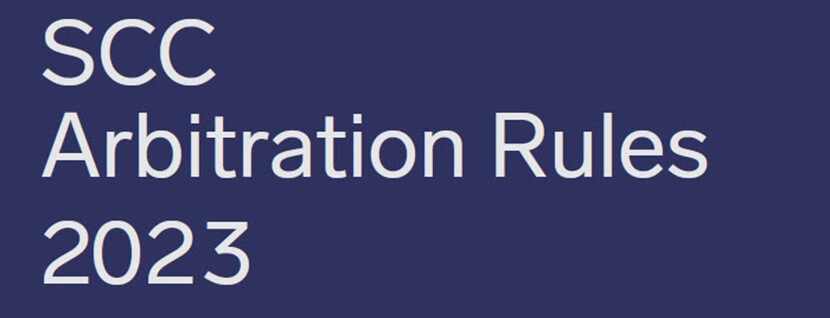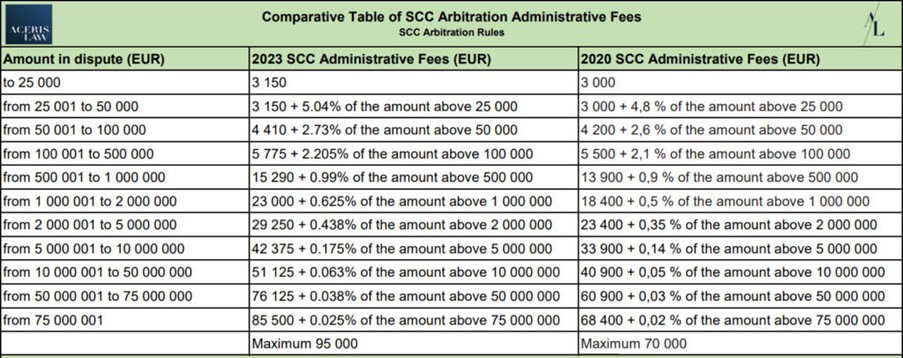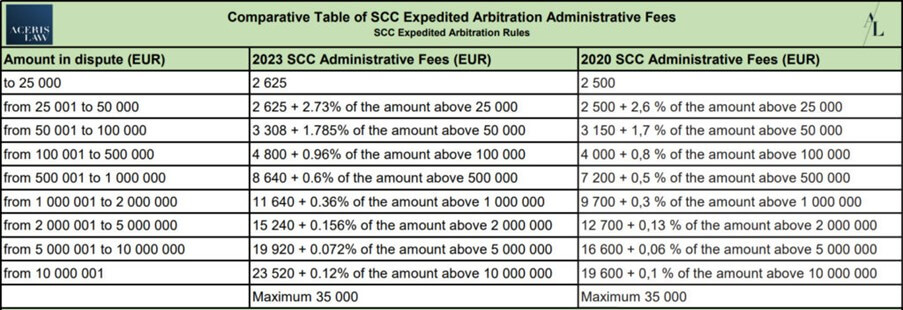The Stockholm Chamber of Commerce (“SCC”) has released revised versions of its arbitration and other dispute resolution rules, which came into force on 1 January 2023, increasing the administrative costs of SCC arbitration, amongst other changes discussed below:
- the 2023 SCC Arbitration Rules;
- the 2023 SCC Schedule of Costs;
- the 2023 SCC Expedited Arbitration Rules;
- the SCC Schedule of Costs for Expedited Arbitrations;
- the 2023 SCC Express Rules;
- the 2023 SCC Procedures for the Administration of Cases under the 2010 UNCITRAL Arbitration Rules;
- the 2023 SCC Procedures for the Administration of Cases under the 1976 UNCITRAL Arbitration Rules; and
- the 2023 SCC Mediation Rules.
The SCC also changed its name from the “Arbitration Institute of the Stockholm Chamber of Commerce” to the “SCC Arbitration Institute”. Changes to the SCC rules were thus made to reflect this name change.
Apart from the cost increase, only minor changes were made to the SCC Arbitration Rules, which have been revised several times since they were first adopted in 1976. More material changes were made to the SCC Mediation Rules, which had not been revised since 2014.

For context, the SCC administers roughly 150-200 new cases per year (2021 SCC Statistics). In 2021, the SCC registered 165 new cases, out of which 103 cases were under the Arbitration Rules, 49 cases were under the Expedited Rules, 7 cases were Emergency Arbitrator proceedings, 4 were ad hoc, one was under the UNCITRAL Rules, and one was under the Mediation Rules. The majority of cases (113) were under Swedish law.
2023 SCC Arbitration Rules
The 2023 SCC Arbitration Rules (“2023 Arbitration Rules”) replace the 2017 version of the SCC Arbitration Rules (“2017 Arbitration Rules”), which applied previously.
Cost Increase: While arbitrators’ fees remained unchanged, the SCC administrative fees, which were previously revised in 2020, increased under the 2023 SCC Schedule of Costs, as shown in the comparative table below, with a 35.71% increase of the maximum amount from EUR 70,000 to EUR 95,000. For instance, for an arbitration with an amount in dispute of EUR 6,000,000, SCC administrative fees (excluding VAT) are now raised from EUR 35,300 (under the 2020 SCC Schedule of Costs) to EUR 44,125 (under the 2023 Schedule of Costs), which represents a cost increase of 25%:

However, the non-refundable registration fee remains the same at EUR 3,000 (Article 1 of Appendix IV, Schedule of Costs).
Article 23: The wording of Article 23(1) of the Arbitration Rules was made imperative. Instead of “may”, Article 23(1) of the 2023 Arbitration Rules now provides that the arbitral tribunal “shall” conduct the arbitration as it considers appropriate (subject to the Arbitration Rules and any agreement between the parties).
Article 29: The wording of Article 29 of the Arbitration Rules was also modified to clarify which information shall be included in the statement of claim and the statement of defence. The 2023 Arbitration Rules now provide that the statement of claim (Article 29(1)(ii)) and the statement of defence (Article 29(2)(iii)) shall include, among other items, “the facts and other circumstances” the claimant/respondent relies on. To compare, the 2017 Arbitration Rules referred to “the factual and legal basis” the claimant/respondent relies on.
Article 32: The wording of Article 32(2) of the Arbitration Rules was revised to clarify that the arbitral tribunal shall decide “whether any hearing shall be conducted (a) in person, at a specified location, or (b) remotely, in whole or in part, by videoconference or other appropriate means of communication.” This foreseeable addition reflects the increased number of virtual hearings prompted by the COVID-19 pandemic.
Article 45: Article 45(2) of the Arbitration Rules was also revised to include a possibility for the arbitral tribunal to terminate the arbitral proceedings by way of an order (apart from an award) if the termination occurs before the final award is made for any reason apart from a settlement (“If the arbitration is terminated for any other reason before the final award is made, the Arbitral Tribunal shall issue an order or award recording the termination.”). To compare, the 2017 Arbitration Rules stipulated that termination in those circumstances could only be achieved via an award (“If the arbitration is terminated for any other reason before the final award is made, the Arbitral Tribunal shall issue an award recording the termination.”).
This sensible change promotes efficiency, as the tribunal can swiftly terminate the proceedings via a procedural order instead of a more formal award. Termination before the final award can occur, for instance, if the claimant fails, without good cause, to submit a statement of claim and the respondent has not filed a counterclaim (Article 35(1)) or if a party fails to comply with an order to provide security for costs (Article 38(3)) or if a party fails to pay the advance on costs (Article 51(5)).
Article 45(1) of the Arbitration Rules remained unchanged, requiring a “consent award” to be rendered if the parties reached a settlement before the final award. A procedural order will thus not suffice in this instance to terminate the arbitration.
Article 51: Article 51(5) of the Arbitration Rules was also changed to include a clause providing that if a party fails to pay the advance of costs and “the case has been referred to the Arbitral Tribunal, the Arbitral Tribunal shall terminate the case in whole or in part.” Before the referral of the case to the tribunal, the power to dismiss the case lies with the SCC Board of Directors. Under Article 51(5) of the 2017 Arbitration Rules, there was no distinction based on the referral of the case to the arbitral tribunal, and it was for the SCC Board to dismiss a case in case of non-payment of the advance of costs.
This change is in line with provisions of other rules, such as Article 24.8 of the 2020 LCIA Arbitration Rules, which provides that failure to pay the advance of costs “may be treated by the LCIA Court or the Arbitral Tribunal as a withdrawal” of the respective claims (further information on this topic may be found in our note on Non-Payment of Advances on Costs in Arbitration).
Model Arbitration Clause: The 2023 Arbitration Rules have also removed agreement on the number of arbitrators as a recommended addition to the SCC model arbitration clause. To compare, the 2017 Arbitration Rules recommended that the parties include in their arbitration agreement the following clause: “The arbitral tribunal shall be composed of three arbitrators/a sole arbitrator”, which has now been deleted. Under Article 16(2) of the 2023 Arbitration Rules (which remains unchanged), absent an agreement of the parties, “the Board shall decide whether the Arbitral Tribunal shall consist of a sole arbitrator or three arbitrators, having regard to the complexity of the case, the amount in dispute and any other relevant circumstances.”
The number of arbitrators has a significant impact on overall arbitration costs. The advantage of agreeing on the number of arbitrators after a dispute has arisen is that the complexity of the case can be taken into account to determine the appropriate number of arbitrators for the dispute. This prevents, for instance, the common scenario where the parties have agreed (in their arbitration agreement) on a three-member tribunal for a case with only a small amount in dispute (and they are unable, once a dispute has arisen, to modify their agreement to appoint a sole arbitrator), thus being required to pay disproportionate arbitrators’ fees for a small amount in dispute. The SCC Board (Article 3) is also a neutral party, well suited to provide a decision on this issue, whilst minimising potential dilatory tactics (i.e., a party insisting on three arbitrators to drive up costs).
Language Modifications: Several language revisions were also made to improve the clarity and coherency of the SCC Arbitration Rules. For instance, Article 24(5) of the 2023 Arbitration Rules now provides that the secretary of the tribunal may be “released” instead of “removed” from his/her duties.
2023 SCC Rules for Expedited Arbitrations
The 2023 SCC Expedited Arbitration Rules replace the 2017 version of the Expedited Rules, which applied previously. To recall, the SCC Expedited Rules apply only by express agreement of the parties either in their arbitration agreement or after a dispute has arisen. Their application is thus not linked to the amount in dispute, as for other institutional rules (see, for instance, Article 42.1(a) – Expedited Procedure – of the 2018 HKIAC Administered Arbitration Rules).
Cost Increase: While arbitrators’ fees remained unchanged, the SCC administrative fees for Expedited Arbitrations, which were previously revised in 2020, increased under the 2023 SCC Schedule of Costs for Expedited Arbitrations, as shown in the comparative table below. For instance, for a case with an amount in dispute of EUR 6,000,000, the SCC administrative fees (excluding VAT) are now raised from EUR 17,200 (under the 2020 SCC Schedule of Costs) to EUR 20,640 (under the 2023 Schedule of Costs), which represents a cost increase of 20%. However, the maximum amount of administrative fees for expedited arbitrations remains unchanged at EUR 35,000. The non-refundable registration fee (EUR 2,500) did not change either (Article 1 of Appendix III, Schedule of Costs):

The rest of the changes made to the 2023 SCC Expedited Arbitration Rules largely mirror the changes made to the 2023 Arbitration Rules, which were discussed above. For instance:
- The wording of Article 6(iii) (Request for Arbitration) and Article 9(iii) (Answer to Request for Arbitration), which specifies the mandatory content of the initial submission of the parties, was changed to “the facts and other circumstances” the claimant/respondent relies on from “the factual and legal basis” the claimant/respondent relies on.
- Article 33(2) was modified to specify that the arbitral tribunal may decide whether hearings shall be conducted in person or remotely.
- Article 45(2) was also modified to include a possibility for the arbitral tribunal to terminate the arbitral proceedings by way of an order (apart from an award).
- Article 51(5) was also changed, now providing that a decision to terminate a case in whole or in part due to a failure to pay the advance on costs shall be made by the arbitral tribunal after the referral of the case to the arbitral tribunal.
2023 SCC Express Rules
The 2023 SCC Express Rules replace the 2021 SCC Rules for Express Dispute Assessment. First introduced in 2021, the SCC Express Rules provide a new, hybrid form of alternative dispute resolution between arbitration and mediation. Depending on what the parties want, the SCC Express Rules offer a binding or non-binding legal assessment of their dispute by a neutral professional (Article 2(4)).
No substantial changes appear to have been made to the SCC Express Rules, except for language revisions, reflecting, inter alia, the SCC’s name change.
* * *
In sum, whilst not significant, the amendments introduced by the 2023 Arbitration Rules for regular and expedited arbitrations improve the wording and codify recent trends in international arbitration, such as the increased use of virtual hearings. Costs have been increased, however.